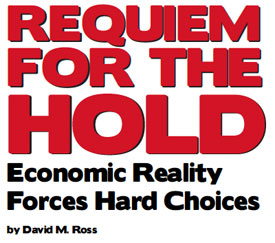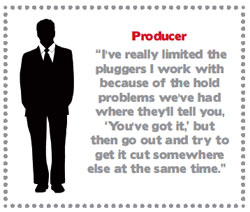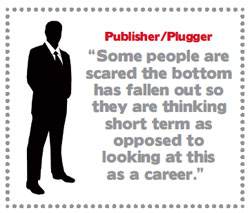
 “A hold now has become a definite maybe,” Chuck Neese told MusicRow in 1988.
“A hold now has become a definite maybe,” Chuck Neese told MusicRow in 1988.
In 1995 then Capitol A&R head Mark Brown stated, “A problem with holds has always existed, [but] lately things are reaching epidemic proportions. Producers and labels have gotten very aggressive about wanting to find a song first. Instead of taking a copy to listen to again and/ or play for the artists, they just instantly say, ‘Put it on hold.’ It places a great deal of pressure on the song community.”
In Nashville a “hold” is a verbal agreement between writers, publishers, producers, artists and/or A&R execs to record a particular song. In the mid-‘70s it began with a producer calling up a publisher and saying, “Hold that song, we’re going in to cut it tomorrow.” But today, top level participants say the traditional hold is fast becoming a memory.
The dictionary defines “hold” as: a) To have or maintain control over b) To reserve or keep back from use c) To have as a responsible position or a privilege d) To bind by a contract.
 Sounds simple, so what’s the problem? Economics is exacerbating concerns on all sides. Mechanical royalties, created by album sales, were once a measurable quantity that could be used to recoup writer advances. Unfortunately, that revenue stream has mostly evaporated. In its stead is the need to earn the performance royalties generated by a Top Ten airplay single. This means that to stay employed, publishers and writers must position their songs for success with the strongest possible radio artists. Meanwhile, producers and labels still have to find great material to help break new artists. And now there are so many layers of decision makers involved in the process— managers, multiple publishers, writers, A&R, etc. It creates a brutal tug of war.
Sounds simple, so what’s the problem? Economics is exacerbating concerns on all sides. Mechanical royalties, created by album sales, were once a measurable quantity that could be used to recoup writer advances. Unfortunately, that revenue stream has mostly evaporated. In its stead is the need to earn the performance royalties generated by a Top Ten airplay single. This means that to stay employed, publishers and writers must position their songs for success with the strongest possible radio artists. Meanwhile, producers and labels still have to find great material to help break new artists. And now there are so many layers of decision makers involved in the process— managers, multiple publishers, writers, A&R, etc. It creates a brutal tug of war.
In fact, the landscape has become such a minefield that in order to honestly address the situation we realized it would be necessary to offer anonymity to all participants. MusicRow spoke with high powered publisher/pluggers, producers and A&R execs, who graciously agreed to share their deep concerns over the hold’s present and future. Here’s what they had to say.
Q: What does the Hold mean to you today?
A&R Person: “Hold” doesn’t have the meaning it once did. It’s a tough time now and everyone needs the best cuts they can get. Many of my acts are new and putting things on hold is the only chance I have to get something. But regardless, if a bigger artist comes around, most likely I’ll lose it no matter what. It’s the publisher’s copyright. They have the right to decide what they want to do, but it’s frustrating when you’ve played the song for the artist and the producer, everyone’s excited and then a bigger artist grabs it away.
Publisher/Plugger: Look at the purpose of a hold and the end game. The record label needs amazing material for its artists that the consumer will want to listen to and buy. They go to the best songwriters to find it. The hold is just one piece of that process. Generally without a hold you don’t have a cut, so yes, we do give holds. A publisher’s first responsibility is to the writer—not the artist or producer. Each situation is unique. There’s an inherent unfairness to a process that can tie up a writer’s song and a publisher’s inventory because the record label is taking an unreasonable amount of time to make decisions. In each case you look at the players, people and relationships, then decide what is best for that songwriter. Communication is key. If you aren’t communicating with all parties, then you aren’t doing it right.
Producer: In my perspective a mutual hold is something I have first rights on until I have the opportunity to play it for my artist. Usually that’s about a month window depending upon how active the artist is. I’ve had songs on hold for 8 months, but we’ve cut them. It’s been songs we’ve loved and really wanted. And I’ve given songs up before because we couldn’t commit 100% even though we loved it. We hated giving it up, but couldn’t let a writer miss out on a Kenny Chesney cut or something like that. It’s more of a respect thing for me.
Publisher/Plugger: Today there are way too many casual holds. An A&R person puts songs on hold at each appointment. Before long, a lot of songs are held that the artist may not ever hear. There’s not enough, “Gosh this is the song I should be fighting for.” Sometimes we have problems with other publishers and young song pluggers who haven’t yet acquired a long term perspective. They don’t realize that if you play a great song for the first person whose office you walk into and they hold it, it’s then out of circulation. Later, that plugger may not have the right properties to show.
 Q: Hold Problems?
Q: Hold Problems?
Producer: Nobody honors a hold anymore. It’s funny how pluggers play a song for twenty other people and tell them I have it on hold to help get backup holds. The whole thing is 100% the pluggers fault. I’ve really limited the pluggers I work with because of the hold problems we’ve had where they’ll tell you, “You’ve got it,” but then go out and try to get it cut somewhere else at the same time. Then they’ll force you in a corner saying, “Hey, I didn’t mean to play it, but they were in my office and I didn’t know they were going in next week but…” I find myself not going back to those pluggers because I don’t like the game they play. I wish pluggers today cared a little more about their and the songwriter’s relationships with the producers. Grow that relationship for the future instead of just throwing something against the wall and hoping it sticks.
Publisher/Plugger: We don’t give second or third holds, we have one hold. Multiple holds is not an ethical way of doing business. We post the date and a termination date when it expires. If my guys go out and pitch a song during that period of time they are going to have to be accountable to me and whoever they promised that song to. Producers have a valid point with a lot of pluggers and it shows because the integrity of a hold has diminished to almost nothing. The number of holds issued in any given day in this town far outnumber what is getting recorded.
A&R Person: I’m OK with pluggers playing something I have on hold because I know everyone is chasing that elusive performance royalty. They should say, “I’m playing this for you, but it is on hold. If you like it I’ll try to get a quick answer.” However, you still give the first shot to the person with the hold. It doesn’t always work that way. It’s a dog-eat-dog world right now. The plugger might call and say, “Hey, we have to make money too. This writer is ready to get dropped, and we have to pick up their option and this cut is on Rascal Flatts and you guys really don’t have anything and we appreciate where you’re coming from and we didn’t mean for this to happen, but we’re gonna take it anyway.” Truthfully, I understand…but it’s hard. I can’t afford to let my act lose a shot at hearing a great song because my ego was hurt when someone took a cut that was better to help feed their writer, I just can’t do it. It’s not personal. Another problem is that with a new artist you must watch the budgets by doing a lot of pre-production. You have to cut 3,4,5 songs at a time to make the numbers work. The budget isn’t there to just cut one or two songs at a time, which means you can’t move as fast as the bigger artists can. But one thing that makes me furious is when they are still pitching a song after you’ve put your money behind it. I’ve spent $20k recording the song and they are still pitching it? That is completely disrespectful to us and makes me never want to have someone in my office again.
Q: How do you react if a producer or A&R person plays artist bait and switch?
Publisher/Plugger: We get to make the call. I tell my pluggers, “It’s like you’re in a casino. You pick where to bet. If people try to move you to another table, you can pick up your money and run, you don’t have to leave it there.” That’s the art of being a great song plugger, you pick your bet. What some pluggers forget is to carefully learn their market and artists, then trust their instincts. And you can’t only shoot for those special moments when the stars completely line up. If you have a relationship with an artist or producer that you feel can be of value for many, many years then you have to let the song find its way. Some people are scared the bottom has fallen out so they are thinking short term as opposed to looking at this as a career. It’s never been perfect in all these years, but it seems to me there was a time when it worked better.
Producer: I have multiple acts, but I’ll specifically ask the plugger, “I want to hold this for artist A, but if he passes can I play it for another artist?” He may answer, “If artist A passes then we really want to get this to Strait.” I understand that, but sometimes if I’ve gotten that plugger a bunch of cuts, they’ll work with me. As long as we can respect the hold and not let them miss a Tim McGraw or something. It’s a tricky thing. I don’t care what anybody says, there’s no cure for the hold. It’s about relationships and respect for the people you’re working with including the songwriters. And that’s the crime. Songwriters are not being respected by people who are throwing these things away. I have a lot of respect for songwriters and understand that one hit can change their life. It’s unfair for me to take that one song away from them forever and then not commit to cutting it.
Publisher/Plugger: There are times in this business when labels, artists, publishers, and/ or songwriters have to give each other bad news. The mechanical royalty has become so devalued that you absolutely need singles to keep a songwriter in a deal. Without singles, they don‘t have jobs. So when the “play it for my other artist?” question comes up we appreciate the belief in our song, but if we did give it to you for a particular artist we may have to reserve the right to investigate some other opportunities before we can go down that path.
Q: Is the Nashville song community unique?
Publisher/Plugger: Song plugging sets Nashville apart from all the other songwriting and publishing communities in the world. It’s a service we provide to our songwriters that no one else in any other territory does the way we do. Casting is part of that. Pitching to the biggest artist on the pitch sheet is not always the best way. Pairing a song with the right artist is an art form that improves the chances of having a monstrous hit. I read where Jake Owen said he passed on “Big Green Tractor” saying, “I didn’t feel that song fit me. I didn’t grow up riding a big tractor.” That’s a smart artist. He recognized a strong song, but realized it didn’t fit him and instead waited for one that did. And he picked a great song with ‘Barefoot Blue Jean Night’ that fit him well.
A&R Person: There are publishers that are amazing at casting and they bring you exactly what they think you need. Anyone who is passionate about what they do can come play songs for me, but the ones that cast, know the artists and are really trying to help, those are the ones that I love meeting with. There are also publishers that just bring over their newest ten song session and let you filter through them which is fine, but doesn’t save me time. And part of their job is to make mine easier. Publisher/Plugger: There was a point in this town when you had about 25 imprints and there was enough “pizza” to feed everyone. Now you have to make choices. Many songs are co-written so there are many publishers plus independent creative people working on each song. You can have 3-7 (or more) folks actively working to get a song recorded and everyone has an equal say. You have to communicate it out and sometimes it means someone is not going to be happy. To me, it is all about transparency and communication, but sometimes they can be tough conversations to have.
A&R Person: Myself and many others I talk with would like holds to evolve into “Whoever cuts it first and puts their money behind it.” That’s how you assess belief. Whoever cuts it first has spoken with what is most precious, money. •

Category: Exclusive, Featured, Publishing, Weekend
About the Author
Journalist, entrepreneur, tech-a-phile, MusicRow magazine founder, lives in Nashville, TN. Twitter him @davidmross or read his non-music industry musings at Secrets Of The ListView Author Profile


